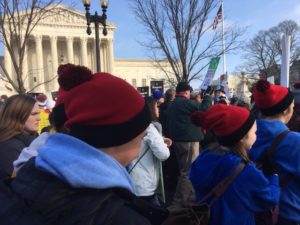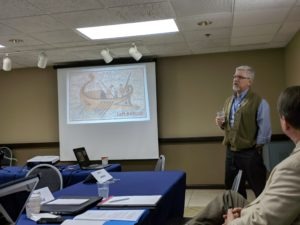Letter from the Director – February 2019

NALC LIFE CONFERENCE AND MARCH FOR LIFE
WERE AWESOME AND INSPIRING
Many thanks to Pastor Dennis DiMauro for organizing and to the congregation of Trinity Lutheran Church in Warrenton, Virginia for hosting the NALC Life Conference the day before the March for Life in Washington D. C. They were both amazing events.
Pastor DiMauro, who holds a Ph. D. in church history, began with a strong Biblical defense of the pro-life position along with a summary of how many great Christian leaders have spoken out in defense of life in the womb. We were all mightily encouraged as we heard how the current number of abortions is the lowest since the Roe v. Wade Supreme Court Decision in January 1973. We were also told that three-fourths of Christianity is pro-life and to anticipate 100,000 participants in the March for Life the next day.
The next speaker, Mona Fuerstenau, from Bethesda Lutheran Communities, has been a disability advocate for over thirty years. She reminded us of how as followers of Jesus we need to speak up for all people, no matter the age, stage, or level of ability or disability. She referenced two passages of Scripture, 1 Corinthians 12: 22 and 1 Peter 4: 10. Paul wrote to the Corinthians, “The members of the body that seem to be weaker are indispensable.” Those who “seem to be weaker,” such as the disabled, can be seen as having nothing to contribute. On the contrary, God calls all of us to minister in His Kingdom. The title of her talk was “Everyone is necessary in the body of Christ, and we have a lot of work to do!” She also quoted 1 Peter 4: 10. “Each of you should use whatever gift you have received to serve others, as faithful stewards of God’s grace in its various forms.” The verse contains no qualifier and gives no exception. Instead it says, “each of you.”
Mona has a son with a significant disability. He accompanies her as she goes around to speak. Mona finds that the way people respond to her son is a good litmus test for the congregation. She can tell within the first five minutes in the way in which she and her son are greeted whether this congregation will be welcoming to people with disabilities.
The third speaker, Melissa Ohden, was amazing. She is the survivor of a failed saline infusion abortion. I am in awe over people who are able to tell their personal life stories, including sharing their deepest hurts and greatest struggles, in a way that is clear, confident, and compelling.
According to Melissa, we have been fed the lie that abortion prevents suffering. Instead abortion causes suffering – to the parents and grandparents, to say nothing about to the fetus that has been killed. She asked, “If we have lost sixty million lives to abortion, how many hundreds of millions of lives are and have been affected?”
We have also been fed the lie that abortion is about choice. The truth is that the majority of women do not have a choice. Sixty-four percent of women who have had an abortion tell about being coerced into having the abortion. Melissa said, “It is not about empowerment.”
Melissa shared how her maternal grandmother had pressured her birth mother into having an abortion, and for thirty years her birth mother did not know that actually she had survived. She told the amazing story of how she was able to come across her own birth records and then was able to find her father and birth mother. She shared how her ten years of searching were a “journey of mercy.” “God allowed me to learn what I needed to learn and not the rest.” After she truly surrendered her search to God, “everything happened.” She said, “God performs miracles still today; it is not just in the Bible.” “God blessed me with finding my medical records so that I could agitate in this world.” “I loosened my grip on my career so I could fulfill my calling.” “My birth mother is one of my greatest supporters. She tells me, ‘I need you to keep doing this.’”
Melissa concluded by saying, “Women, families, our culture deserve better than abortion.” She then spoke of the March for Life the next day as she shared, “We are not here to have fun. Rather we are here to grieve the loss of life and to find joy and support in each other.”
MARCH FOR LIFE
 We have all heard much about the March for Life, especially in light of the events that took place near the Lincoln Memorial. I personally was not near the Memorial, so I cannot speak from personal observation. But I am very glad for recent reports which have exonerated the students from the Catholic school in Kentucky.
We have all heard much about the March for Life, especially in light of the events that took place near the Lincoln Memorial. I personally was not near the Memorial, so I cannot speak from personal observation. But I am very glad for recent reports which have exonerated the students from the Catholic school in Kentucky.
The main thing I would want to share is how deeply impressed I was with the very large number of young adults who were enthusiastic participants in the March. We constantly hear about the conspicuous absence of young people from our churches. Younger people are not attending traditional denominational churches. And it is not just the Lutheran churches. We wonder what will happen to our churches if we continue to be unable to reach younger people.  And yet somehow the pro-life movement has been able to catch the attention and capture the enthusiasm, energy, and commitment of the millennial generation. Our churches, and many other groups that promote traditional values, have much to learn from the pro-life movement. How could we place ourselves in a position for that movement to teach us?
And yet somehow the pro-life movement has been able to catch the attention and capture the enthusiasm, energy, and commitment of the millennial generation. Our churches, and many other groups that promote traditional values, have much to learn from the pro-life movement. How could we place ourselves in a position for that movement to teach us?
There are two other things I would like to say. First, how clean the march route was after the event. The crowd was huge, but they were polite and respectful in addition to being massive. Second, how deeply I was moved at the end of the route, in front of the Supreme Court Building, by all the signs which read, “I Regret My Abortion.” What can we do to help keep more women from making a choice and taking an action that later they will regret? The song that was sung at the end of the National Memorial Service for the Pre-Born and Their Mothers and Fathers earlier that morning contained these words: “What was your name? What were you meant to be? I wish I could have known.”
“REKINDLE YOUR FIRST LOVE” EVENT
I remember a several year period – during the years when I was serving as a pastor before I retired – when I would have jumped at the chance to be able to attend a gathering which was intended to help me regain my first love. I recall the energy, enthusiasm, and optimism with which I began my ministry. I served the same congregation for forty years. After eighteen years there we completed a major, two-million-dollar development of the property, including the building of a new sanctuary and fellowship hall. But then, immediately afterwards, began a process in which all hell broke loose.
One of the major families in the congregation became intensely angry with me. For a full year I received hate mail from them, as often as three times in the same day. When the congregation council finally stood up to them, they left. During the same time, as well as immediately afterwards, I was accused of having an affair with one of the staff members, our school principal was accused of embezzling funds, and the rumor was that there must be a reason why the school principal was able to blackmail me into being silent. For years this kind of behavior was tolerated and allowed to continue. When it was finally confronted, the inevitable blow up occurred, and everyone who was contributing to the problem, as well as everyone else whom they could influence, left within a matter of a few weeks. I gained a new appreciation for Paul’s image of the church as the body of Christ. In order to be able to survive, a living organism must be able to get rid of highly toxic material. The church finally stood up to and was delivered from everyone who was engaging in highly toxic behavior. But the damage was done – to the congregation, as well as to my relationship with the congregation. I could have used a “Rekindle Your First Love” event.
For most of you I do not know what you are going through and have gone through. But I do know that ministry is tough. Jesus said that it is going to be tough. No wonder we need to put on the full armor of God.
I would strongly urge you to sign up today. We have a great group of presenters who will lead us in rekindling our first love for Christ, for the church as the body of Christ, and for mission and ministry as the work of Christ in the world. In addition we have a fourth presenter who will help us take the next steps as we move from rekindling to re-establishing the fire of our first love. The presenters represent a wide-range of church body affiliations – NALC, LCMC, and ELCA.
The contemporary Christian singer/song-writer, Keith Green, in his song “Oh Lord, You’re Beautiful,” sings these words –
“Oh Lord, please light the fire That once burned bright and clear. Replace the lamp of my first love.”
The date is Wednesday, May 1. The location is Trinity Lutheran Church in Warrenton, Virginia (the same location as for the NALC Life Conference). Here is a link that will take you to the flier that will tell you more about the gathering and how you can register. I urge you to do so today.
Blessings in Christ,Dennis D. Nelson Executive Director of Lutheran CORE [email protected] 909-274-8591


 October 12.
October 12.



 Brian describes his county as 90% unchurched, which is very different from deep, dark Lutheranism. He said, “The church culture has been bled out.”
Brian describes his county as 90% unchurched, which is very different from deep, dark Lutheranism. He said, “The church culture has been bled out.” 


 St. Timothy’s Lutheran Church ELCA, the host congregation, is in the Hermosa neighborhood of northwest Chicago, which has changed dramatically in the last few decades from being totally Caucasian to totally Latino. In the basement there are pictures of confirmation classes from the 1960’s, made up of thirty to forty very Caucasian looking young people. We were able to experience how the congregation still has a vital opportunity for ministry, though a very different opportunity for ministry, as some of the neighbors joined us for dinner and a prayer service one evening. That evening we also held an outdoor candlelight prayer service for peace in a city that has experienced the tragedy of five hundred homicides so far this year. The neighborhood is a fairly high density neighborhood, so we know that nearby residents witnessed our service. The need for prayers for healing and peace were brought home to us by some graffiti we saw on the way to the church – “An eye for an eye will only make the whole world blind.”
St. Timothy’s Lutheran Church ELCA, the host congregation, is in the Hermosa neighborhood of northwest Chicago, which has changed dramatically in the last few decades from being totally Caucasian to totally Latino. In the basement there are pictures of confirmation classes from the 1960’s, made up of thirty to forty very Caucasian looking young people. We were able to experience how the congregation still has a vital opportunity for ministry, though a very different opportunity for ministry, as some of the neighbors joined us for dinner and a prayer service one evening. That evening we also held an outdoor candlelight prayer service for peace in a city that has experienced the tragedy of five hundred homicides so far this year. The neighborhood is a fairly high density neighborhood, so we know that nearby residents witnessed our service. The need for prayers for healing and peace were brought home to us by some graffiti we saw on the way to the church – “An eye for an eye will only make the whole world blind.”